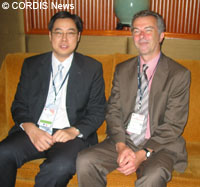Forum highlights success of new Trans -Eurasia Information Network
The Trans -Eurasia Information Network (TEIN2) is the first large-scale data communications network for research and education linking up Europe and South-East Asia. It became operational in January 2006 and has already led to highly successful research collaborations and the networking of research organisations within the South East Asia region. CORDIS News spoke to David West, Project Manager at DANTE, the non-profit organisation charged with coordinating TEIN2, and to Chee Kheong Foong on the catalytic effect that the link-up has had in Malaysia. TEIN2 follows on from two previous and successful link-ups to Europe's multi-gigabit GEANT2 network - with Mediterranean and with Latin American countries. A connection between South Korea and France became known as TEIN1, and the extension took place in 2004 with support of EUR 10 billion from the European Commission. The Asian partners in the project are: China, Indonesia, Japan, South Korea, Malaysia, the Philippines, Singapore, Thailand and Vietnam, and six of these countries receive EU funding. At the Euro-South East Asia forum for information and communications technologies (ICT) collaboration taking place in Singapore on 19 and 20 June, EU Information Society and Media Commissioner Viviane Reding highlighted how TEIN2 has already led to very successful collaborative research projects, and has not involved any brain drain away from Asia as scientists are able to work with overseas colleagues without leaving the lab. Mr West believes that TEIN 2 creates a win-win situation, extending the geographical reach of the network while facilitating collaborative projects between Europe and the 'vibrant and dynamic area' that is South East Asia. Other countries have also shown an interest in joining, including New Zealand and countries in southern Asia. Another EU-Asia success story coming out of TEIN2 is a joint project between France and Cambodia on e-learning in medical training. Students in Cambodia are receiving teaching on medicine through the streaming of multimedia lectures and interactive videoconferencing. Mr West says that in TEIN2 has already accelerated the networking of national networks in four countries. Malaysia is one of these countries, and has now created MYREN - linking together 12 universities. The link-up has already enabled a virtual lecture project involving Malaysia, Japan and China. Students in the three countries are taught at the same time by a teacher from one of these countries, and the lecturers from Malaysia, Japan and China alternate. This could not be done using the ordinary Internet as the quality is not good enough, says Mr Foong. Another project in the pipeline would involve scanning ancient artefacts, such as pottery, and collaborating with researchers in other countries to examine the pieces. At the moment, the key priorities for DANTE are helping the partners to promote the use of the network. As one participant at the conference remarked, 'TEIN2 is huge. Our task is trying to make use of it.' For the future, there are plans to extend the geographical coverage of TEIN2, initially to Laos and Cambodia. Discussions are at an early stage, but the connection could take place as early as the end of 2006 or early 2007. Another priority is to ensure that funding is secured for the period following 2007, when the current contract expires. Given the success of TEIN2 and the interest in it, Mr West is fairly confident that the project will receive funding, but it is, as yet, not guaranteed.
Countries
China, France, India, Japan, Cambodia, South Korea, Malaysia, Philippines, Singapore, Thailand, Vietnam

